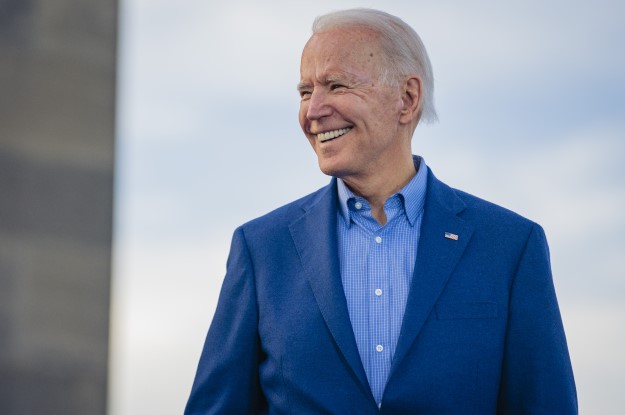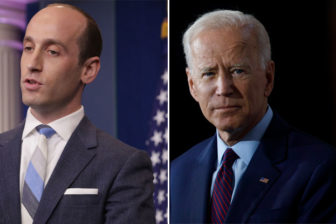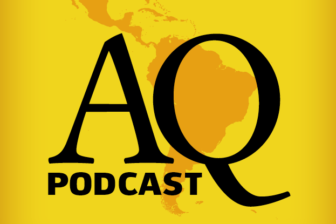Leer en español | Listen to a conversation with Juan S. Gonzalez on The Americas Quarterly Podcast
Editor’s note: In Jan. 2021, President-elect Joe Biden appointed Gonzalez as senior director for the Western Hemisphere at the National Security Council. Gonzalez assessed Biden’s priorities for the region in this opinion piece from July 2020.
We are less than four months from the most consequential election in modern U.S. history. But the stakes may be almost as high for the future of democracy, stability and growth in Latin America and the Caribbean.
On the outcome will hinge a number of core U.S. national security and economic interests. In the Americas, these include the health of shared values and cooperation needed to sustain the United States and its hemispheric partners through crises as urgent as the COVID-19 pandemic, and many other challenges to come in a more competitive world that is quickly reordering itself.
The image of the two candidates sparring over Venezuela, Cuba, and immigration is a caricature of two strikingly different approaches to U.S. relations in the hemisphere. It is worth taking a closer look at those approaches, as they speak volumes about how differently the two sides see the future broadly, or even understand America’s interests.
This administration’s approach to Latin America runs through Miami and its policies are best understood through the distorted prism of South Florida politics. Donald Trump cannot win re-election without Florida, and his administration thinks it can capitalize politically on the anger and suffering of Cuban and Venezuelan voters without regard for outcomes in either country. The president likes to talk tough and roll out sanctions with fanfare. But his refusal to grant Temporary Protected Status (TPS) to Venezuelans, the failure to respond to the outsized humanitarian crisis there, and restrictive measures to increase the suffering of the Cuban people, lay bare a stark truth. The Trump “agenda” is about him – bluster, crocodile tears and whatever gestures might help his re-election – not about America, or its partners in the hemisphere. Meanwhile, his demonization of immigrants, especially from Latin America, is a dog whistle to a minority of Americans who fear their place in an increasingly diverse United States.
Joe Biden’s vision for the region is based on the fundamental belief that promoting a “secure, middle class and democratic hemisphere” is overwhelmingly in the economic and national security interest of the United States. That the United States must work in partnership with its neighbors if it is to win the fight against the COVID-19 pandemic and rebuild the U.S. economy better than before. That in times of great crisis, principled and democratic leadership – anchored in the rule of law – rally nations together toward a common purpose. That multilateral institutions – under the right leadership – give everyone a stake in our future. It is that vision, anchored in empathy for those who are suffering, and a steely understanding of U.S. interests, that will inform the Biden administration’s approach to the Americas. There is no need to take this on faith: There is an extensive record that points to the values, insights and interests that will be at the core of a Biden administration’s policy in the Western Hemisphere.
The immediate task of repairing the damage caused by the Trump Administration at home will orient U.S. foreign policy toward North America. Biden’s plan for combatting the COVID-19 pandemic presents a compelling opportunity to reinvigorate and build upon the North American Plan for Animal and Pandemic Influenza launched in 2012 by the Obama-Biden Administration, especially in the areas of preparedness and supply chain resilience.
His Build Back Better initiative dedicates $2 trillion over four years to addressing the structural weaknesses and inequalities in the U.S. economy by building a modern and sustainable infrastructure, the revitalization of U.S. manufacturing, and a mobilization of R&D not seen since World War II for new technologies such as biotech, clean energy and artificial intelligence. It also seeks to modernize the U.S. auto industry to better compete with China on electric vehicles.
As supply chains contract and China’s economic power grows, Canada and Mexico are indispensable partners for the United States as it seeks to re-establish a globally competitive footing. Biden’s long commitment to those relationships is a strong signal of the priority he will accord them as president. The labor protections that secured Democratic support for ratification of the U.S.-Mexico-Canada Agreement, which updated NAFTA to many of the standards of the Trans-Pacific Partnership that Trump abandoned – matter greatly in this context, as do transparency and fair competition.
On Central America, expect a President Biden to build much stronger cooperation, including with Mexico, in a major investment to help address the economic and social problems that spur illegal migration, including widespread corruption. It is worth recalling that the same week that Donald Trump announced his presidential campaign in 2015 by calling Mexicans “rapists,” Joe Biden was preparing for a meeting with members of the Senate Appropriations Committee to negotiate bipartisan support for an ambitious strategy to address the root causes of migration from Guatemala, El Salvador and Honduras. The initiative began as a June 2014 meeting on increased border enforcement with Mexico and the leaders of the Northern Triangle, but Vice President Biden invested countless hours over nine months to build consensus in favor of more comprehensive effort to tackle the poverty and insecurity driving migration to the United States. The plan was working until the Trump Administration took it apart.
Caribbean countries have been bludgeoned by unique challenges that span devastating natural events, economic dislocation and international crime. We share an interest in helping these countries respond successfully. As vice president, Biden rejected a long tradition of seeing the Caribbean countries as a set of countries to be episodically courted for votes at the United Nations or Organization of American States, and instead championed a series of specific and pragmatic efforts, linked to addressing pressing needs. A good example is the Caribbean Energy Security Initiative (CESI), launched in 2014 to promote energy security as Venezuela’s Petrocaribe oil financing scheme declined. Biden saw an opportunity to undermine Venezuela’s corrupting influence by offering the Caribbean viable alternatives that provided technical advice, brought together the international community, and leveraged the Overseas Private Investment Corporation to drive private investment. The Caribbean will remain a priority of a Biden Administration through initiatives like the Clean Energy Export and Climate Investment Initiative, whose initial focus will be to provide low-cost financing to small island states in the Pacific and the Caribbean that are ready to demonstrate leadership on climate change.
Colombia has no greater partner in the United States than Joe Biden, a country he regularly refers to as the “keystone” to the region. He was present at the creation of Plan Colombia, securing Senate support for the Clinton Administration’s efforts to fund the initiative. He also supported Colombia’s efforts to negotiate peace, trusted the country’s institutions to achieve an outcome supported by the Colombian people, and communicated any concerns in private to avoid distracting from a political debate that was ultimately up to Colombians to resolve. Whereas Trump has re-narcotized the bilateral relationship, Biden’s is a more ambitious vision. He seeks to parlay the decades of cooperation and billions invested into a strategic partnership with positive regional and global implications, and that can advance human rights as a common cause in both our countries. To help realize that vision, a President Biden would stand with Colombia as it manages the mass exodus of Venezuelans into the country, to combat the COVID-19 pandemic, and to address the country’s deteriorating security situation.
More widely in South America, Biden saw the progress of the Pacific Alliance as an opportunity to build on the foundations of existing U.S. trade agreements stretching from Canada to Chile. He also believed the Trans-Pacific Partnership, designed to strengthen and modernize a much broader set of trade relationships with better labor and environmental standards, would create incentives for Mercosur to realign its economic model, and place guardrails on Chinese investment in the Americas.
To move Mercosur, Biden believed the United States had to engage Brazil in the same way as other emerging powers by developing a robust agenda for economic cooperation and a blueprint for a truly strategic partnership by capitalizing on overlapping areas of interest that were increasingly global in nature. These include climate change, where Brazil was positioned to serve as a bridge between the G20 and the G77 economies. The U.S.-Brazil relationship has enormous potential under a Biden administration, whose climate and economic agendas will go hand in hand. The question for Brazil is whether its current leadership is up for addressing the monumental challenges of our time.
When it comes to Cuba and Venezuela, the difference between Joe Biden and Donald Trump is a matter of values and national interests. By every metric, the Trump campaign’s get-out-the-vote strategy for South Florida has failed the Cuban and Venezuelan people, at home and abroad. The overriding goal of the United States in both countries must be to press for a democratic change. That is why a President Biden would grant TPS for Venezuelans in the United States, take serious steps to address the humanitarian situation, help recover every penny stolen from the Venezuelan people, and deploy smart sanctions as part of a broader international strategy to restore democracy. In Cuba, engagement is not a gift to a repressive regime. It is a subversive act to advance the cause of human rights and empower the Cuban people as protagonists of their own future.
The countries of the hemisphere are at an inflection point. The COVID-19 pandemic has laid bare the structural weaknesses in our economies, as well as the persistent inequalities and injustices in our societies. It has also been a painful reminder that we need each other – pandemics and the impacts of global warming do not respect borders. Donald Trump has proven himself wholly unqualified to lead the United States, let alone be an example to the region as it seeks to address monumental challenges. His worldview makes a mockery of the signal achievements of our hemisphere and the Inter-American System in the last 30-years, and it undercuts American interest in successful, free, market-driven countries that can meet the needs of their people.
The great visibility of the United States makes us an example all over the world, for better or for worse. When we live up to our ideals as a nation, it bolsters civic-minded leaders elsewhere. But when our leaders deny facts and model corrupt behavior, it encourages actors who are anathema to our hemisphere’s democratic progress and social advancement. The task of building back better requires us to find common cause in our shared prosperity, a renewed partnership on climate change, a resolve to guarantee the security of our citizens, and a sense of urgency toward realizing a shared vision of a hemisphere that is secure, middle class, and democratic.
—
Gonzalez is a principal at JSG Strategy and a former special advisor to Vice President Joe Biden. The opinions in this piece are his own and do not represent those of any institution or campaign.







